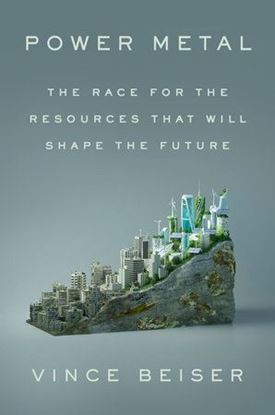

POWER METAL
An Australian millionaire’s plan to mine the ocean floor. Nigerian garbage pickers risking their lives to salvage e-waste. A Bill Gates-backed entrepreneur harnessing AI to find metals in the Arctic.
These people and millions more are part of the intensifying competition to find and extract the minerals essential for two crucial technologies: the internet and renewable energy. In Power Metal, Vince Beiser explores the Achilles’ heel of “green power” and digital technology – that manufacturing computers, cell phones, electric cars, and other technologies demand skyrocketing amounts of lithium, copper, cobalt, and other materials. Around the world, businesses and governments are scrambling for new places and new ways to get those metals, at enormous cost to people and the planet.
Beiser crisscrossed the world to talk to the people involved and report on the damage this race is inflicting, the ways it could get worse, and how we can minimize the damage. Power Metal is a compelling glimpse into this disturbing yet potentially promising new world.
1,995
PRIDE AND PREJUDICE
Generations of readers have fallen in love with Jane Austen’s beloved classic Pride and Prejudice. The sparkling Elizabeth Bennet, the taciturn Fitzwilliam Darcy, and an array of characters that range from irrepressible to almost irredeemable, move through this comedy of manners about the danger of first impressions. Set in a provincial world away from London, Austen’s novel pokes fun at the machinations of courtship rituals while celebrating the importance of friendship and sisterhood.
1,300
PRIDE AND PREJUDICE (ANNOTATED EDICION)
Jane Austen began writing Pride and Prejudice when she was just twenty years old, though it would not be published until seventeen years later, in 1813. Widely regarded as one of the first romantic comedies in literary history, the novel’s entanglements and misunderstandings are deftly interwoven with a sharp, ironic critique of English society.
Mrs Bennet is determined to secure a prosperous future for her five daughters through advantageous marriages. Her second-eldest, Elizabeth, is just as resolute that Fitzwilliam Darcy – the most arrogant, self-important man she has ever met – will not be one of her suitors. Darcy, in turn, considers Elizabeth an unfit match due to her lower social standing and limited connections. Yet the heart seldom obeys reason, and both are forced to examine their own prejudices in the pursuit of true love.
1,550
PRIDE AND PREJUDICE (VINTAGE CLASSIC)
No novel in English has given more pleasure than Pride and Prejudice. Because it is one of the great works in our literature, critics in every generation reexamine and reinterpret it. But the rest of us simply fall in love with it--and with its wonderfully charming and intelligent heroine, Elizabeth Bennet.
We are captivated not only by the novel's romantic suspense but also by the fascinations of the world we visit in its pages. The life of the English country gentry at the turn of the nineteenth century is made as real to us as our own, not only by Jane Austen's wit and feeling but by her subtle observation of the way people behave in society and how we are true or treacherous to each other and ourselves.
650
QUEEN B (4)
Lady Grace Fairfax, witch, knows that something foul is at play that someone had betrayed Anne Boleyn and her coven. Wild with the loss of their leader and her lover, a secret that if spilled could spell Grace’s own end she will do anything in her power to track down the traitor. But there’s more at stake than revenge: it was one of their own, a witch, that betrayed them, and Grace isn’t the only one looking for her. King Henry VIII has sent witchfinders after them, and they’re organized like they’ve never been before under his new advisor, the impassioned Sir Ambrose Fulke, a cold man blinded by his faith. His cruel reign could mean the end of witchkind itself. If Grace wants to find her revenge and live, she will have to do more than disappear.
1,250
QUEEN CHARLOTTE
as the marriage of Queen Charlotte and King George of England leads to an unexpected love story and a union that transforms society.
In 1761, on a sunny day in September, a King and Queen met for the very first time. They were married within hours.
Born a German Princess, Charlotte of Mecklenburg-Strelitz was beautiful, headstrong, and fiercely intelligent… not precisely the attributes the British Court had been seeking in a spouse for the young King George III. But her fire and independence were exactly what she, and her King, needed.
Because George has secrets… secrets with the potential to shake the very foundations of the monarchy.
750













